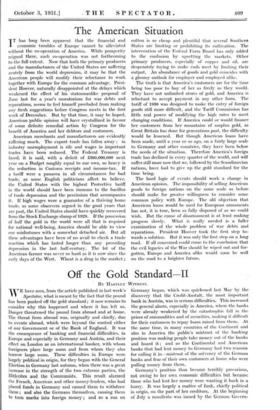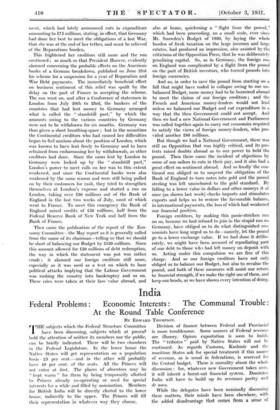Off the Gold Standard II
BY HAItTLEY WITHERS.
WE have seen, from the article published in last week's Spectator, what is meant by the fact that the pound has been pushed off the gold standard ; it now remains to consider why this happened and where it has left us. Danger threatened the pound from abroad and at home. The threat from abroad was, originally and chiefly, due to events abroad, which were beyond the control either of our Government or of the Bank of England. It was the consequence of banking and financial difficulties, in Europe and especially in Germany and Austria, and their effect on London as an international banker, with whom foreigners place large sums and from whom they also borrow large sums. These difficulties in Europe were largely political in origin, for they began with the General Election in Germany last autumn, when there was a great increase in the strength of the two extreme parties, the Hitlerites and the Communists. This result alarmed the French, American and other money-lenders, who had placed funds in Germany and caused them to- withdraw them ; and also the Germans themselves, causing them to turn marks into foreign money ; and so a run on Germany began, which was quickened last May by the discovery that the Credit-Anstalt, the most important bank in Austria, was in serious difficulties. This increased the general alarm, especially in America, where the banks were already weakened by the catastrophic fall in the prices of commodities and of securities, making it difficult for their customers to repay loans raised from them. At the same time, in many countries of the Continent and also in America the public's mistrust of the banking position was making people take money out of the banks and hoard it ; and so the Continental and American banks that had lent money to Germany had two reasons for calling it in—mistrust of the solvency of the German banks and fear of their own customers at home who were pulling money from them.
Germany's position thus became terribly precarious, not owing to her own economic difficulties but because those who had lent her money were wanting it back in a hurry. It was largely a matter of funk, chiefly political in origin, on the part of her creditors. At the beginning of July a manifesto was issued by the German Govern- mcnt, which had lately announced cuts in expenditure amounting to £75 millions, stating, in effect, that Germany had done her best to meet the obligations of a lost War, that she was at the end of her tether, and must be relieved of the Reparations burden.
This frightened her creditors still more and the run continued ; so much so that President Hoover, evidently alarmed concerning the probable effects on the American banks of a German breakdown, published on June 21st his scheme for a suspension for a year of Reparation and War Debt payments. The immediately beneficial effect on business sentiment of this relief was spoilt by the delay on the part of France in accepting the scheme. The run went on, and after a Conference of statesmen in London from July 20th to 23rd, the bankers of the countries that had lent money to Germany arranged what is called the " standstill pact," by which the amounts owing to the various countries by Germany were not to be withdrawn for six months. Germany was thus given a short breathing-space ; but in the meantime the Continental creditors who had caused her difficulties began to feel anxious about the position of London, which was known to have lent freely to Germany and to have refrained from embarrassing her by withdrawals, as other creditors had done. Since the sums lent by London to Germany were locked up by the " standstill pact,", London's power to meet calls on her was to this extent weakened, and since the Continental banks were also weakened by the same reason and were still being pulled on by their customers for cash, they tried to strengthen themselves at London's expense and started a run on London, taking over £30 millions out of the Bank of England in the last two weeks of July, most of which went to France. To meet this emergency the Bank of England raised credits of £50 millions, half from the Federal Reserve Bank of New York and half from the Bank of France.
Then came the publication of the report of the Eco- nomy Committee—the May report as it is generally called from the name of its chairman—telling us that we should be short of balancing our Budget by £120 millions. Since this amount allowed for £50 millions of debt redemption, the way in which the statement was put was rather crude ; it alarmed our foreign creditors still more, especially as it was used as a text on which to base political attacks implying that the Labour . Government was rushing the country into bankruptcy and so on. These cries were taken at their face value abroad, and also at home, quickening a " flight from the pound," which had been proceeding, on a small scale, ever since Mr. Snowden's Budget of 1930, by laying the whole burden of fresh taxation on the large incomes and large estates, had produced an impression, also assisted by the criticisms of the Opposition Presi, that he was deliberately penalizing capital. So, as in Germany, the foreign run on England was complicated by a flight from the pound on the part of British investors, who turned pounds into foreign currencies.
And so, in order to save the pound from starting on a fall that might have ended in collapse owing to our un- balanced Budget, more money had to be borrowed abroad to meet the claims of our foreign creditors ; and the French and American money-lenders would not lend unless we balanced our Budget and cut expenditure in a way that the then Government could not accept. And then we had a new National Government and Parliament was called together again to carry out economies required to satisfy the views of foreign money-lenders, who pro- vided another £80 millions.
But though we had a National Government, there was still an Opposition that was highly critical, and its pro tests raised doubts abroad as to our power to hold the pound. Then there came the incident of objections by some of our sailors to cuts in their pay, and it also had a great effect on sentiment abroad. And so finally. the con- tinued run obliged us to suspend the obligation of the Bank of England to turn notes into gold and the pound sterling was left unanchored to the gold standard. By falling to a lower value in dollars and other moneys it at once (as shown last week) checks imports and stimulates exports and helps us to restore the favourable balance, in international payments, the loss of which had weakened our financial position.
Foreign creditors, by making this panic-stricken run on us, because we had refused to join in the stupid run on Germany, have obliged us to do what distinguished eco- nomists have long urged us to do—namely, let the pound go to a lower exchange value. If we had done it delibe- rately, we might have been accused of repudiating part of our debt to those a In had left money on deposit with us. Acting under this compulsion we are free of this charge. And so our foreign creditors have not only obliged us to balance our Budget, but also to revalue the pound, and both of these measures will assist our return to financial strength, if we make the right use of them, and keep our heads, as we have shown every intention of doing.











































 Previous page
Previous page